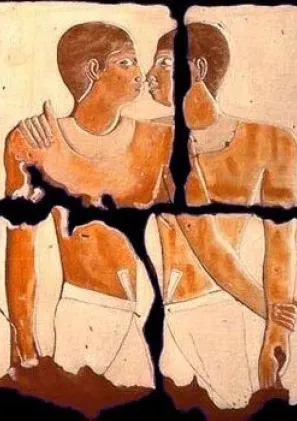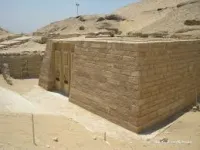Biography
circa 2400 BC - circa 2400 BC
The tomb of royal manicurists Khnumhotep and Niankhkhnum was discovered by Egyptologists in 1964. Described in the hieroglyphics as "royal confidants," the men were among the privileged few people who were actually permitted to touch the pharaoh. Dating from the Fifth Dynasty of King Niuserre, the tomb depicts two men in a manner usually reserved for husband and wife. In one striking portrayal, the two embrace – noses touching – in the most intimate pose allowed by canonical Egyptian art. They are believed by some to be the first recorded same-sex couple in history. Though homosexuality was not uncommon in Ancient Egypt, the exact nature of the relationship between the two men is nearly impossible to discern since no evidence exists beyond the imagery in the tomb. The presence of their wives and off-spring in certain panels among the glyphs has led many Egyptologists to conclude they were siblings. But repeated depictions of the two men embracing have convinced many that their intimate relationship might have been accepted by their respective wives. One thing is certain: two men of equal social standing being buried together in the same tomb – in spite of the fact that they were undoubtedly married to women – was unique. That this remarkably preserved archeological find is one of the largest and most beautifully decorated tombs in the Saqqara necropolis also suggests that whatever the nature of their relationship, the pharaoh approved of it because tombs of this caliber were enormously expensive. The mystery may remain forever locked in the mixed messages of the tomb’s hieroglyphics, but the words the men chose to have inscribed over the entrance are unambiguously clear: "JOINED IN LIFE AND JOINED IN DEATH."
circa 2400 BC - circa 2400 BC
The tomb of royal manicurists Khnumhotep and Niankhkhnum was discovered by Egyptologists in 1964. Described in the hieroglyphics as "royal confidants," the men were among the privileged few people who were actually permitted to touch the pharaoh. Dating from the Fifth Dynasty of King Niuserre, the tomb depicts two men in a manner usually reserved for husband and wife. In one striking portrayal, the two embrace – noses touching – in the most intimate pose allowed by canonical Egyptian art. They are believed by some to be the first recorded same-sex couple in history. Though homosexuality was not uncommon in Ancient Egypt, the exact nature of the relationship between the two men is nearly impossible to discern since no evidence exists beyond the imagery in the tomb. The presence of their wives and off-spring in certain panels among the glyphs has led many Egyptologists to conclude they were siblings. But repeated depictions of the two men embracing have convinced many that their intimate relationship might have been accepted by their respective wives. One thing is certain: two men of equal social standing being buried together in the same tomb – in spite of the fact that they were undoubtedly married to women – was unique. That this remarkably preserved archeological find is one of the largest and most beautifully decorated tombs in the Saqqara necropolis also suggests that whatever the nature of their relationship, the pharaoh approved of it because tombs of this caliber were enormously expensive. The mystery may remain forever locked in the mixed messages of the tomb’s hieroglyphics, but the words the men chose to have inscribed over the entrance are unambiguously clear: "JOINED IN LIFE AND JOINED IN DEATH."
Demography
Demography
Gender Male
Sexual Orientation Gay
Gender Identity Cisgender
Ethnicity Middle Eastern
Nations Affiliated Egypt
Era/Epoch Antiquity/Ancient History (beginning of recorded history-476 CE)
Field(s) of Contribution
Management
Demography
Gender Male
Sexual Orientation Gay
Gender Identity Cisgender
Ethnicity Middle Eastern
Nations Affiliated Egypt
Era/Epoch Antiquity/Ancient History (beginning of recorded history-476 CE)
Field(s) of Contribution
Management
Resources
Resources
http://en.wikipedia.org/wiki/Khnumhotep_and_Niankhkhnum
http://epistle.us/hbarticles/ancientegypt2.html
http://www.egyptology.com/niankhkhnum_khnumhotep/dallas.html
http://www.nytimes.com/2005/12/20/science/20egyp.html?oref=login&_r=0
https://www.makingqueerhistory.com/articles/2016/12/20/khnumhotep-and-niankhkhnum-and-occams-razor
https://www.jstor.org/stable/827865?seq=1#page_scan_tab_contents
https://www.them.us/story/themstory-ancient-egypt
https://www.out.com/entertainment/popnography/2010/04/gays-of-old-khnum…
Resources
http://en.wikipedia.org/wiki/Khnumhotep_and_Niankhkhnum
http://epistle.us/hbarticles/ancientegypt2.html
http://www.egyptology.com/niankhkhnum_khnumhotep/dallas.html
http://www.nytimes.com/2005/12/20/science/20egyp.html?oref=login&_r=0
https://www.makingqueerhistory.com/articles/2016/12/20/khnumhotep-and-niankhkhnum-and-occams-razor
https://www.jstor.org/stable/827865?seq=1#page_scan_tab_contents
https://www.them.us/story/themstory-ancient-egypt
https://www.out.com/entertainment/popnography/2010/04/gays-of-old-khnum…





